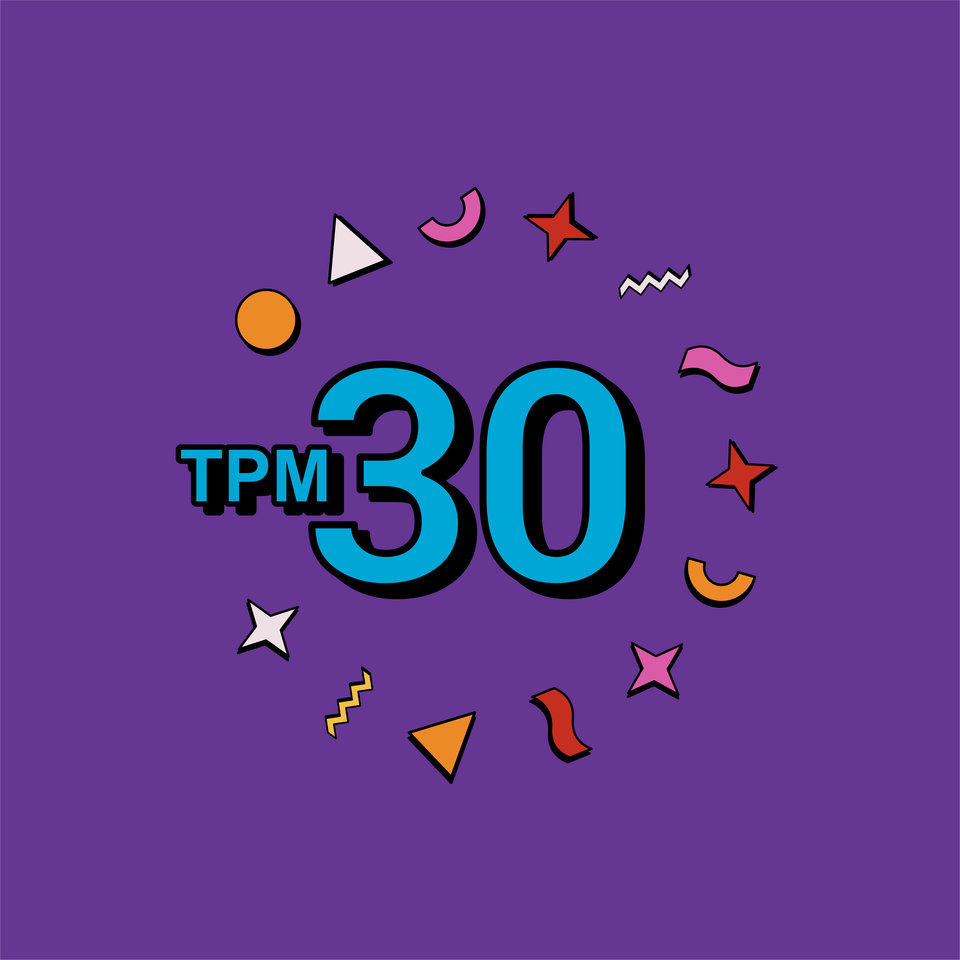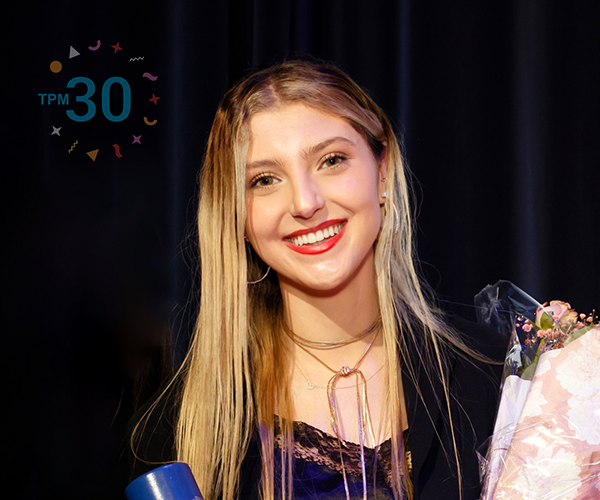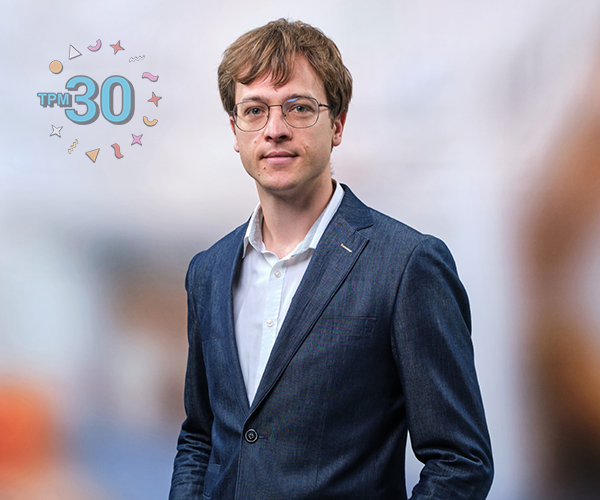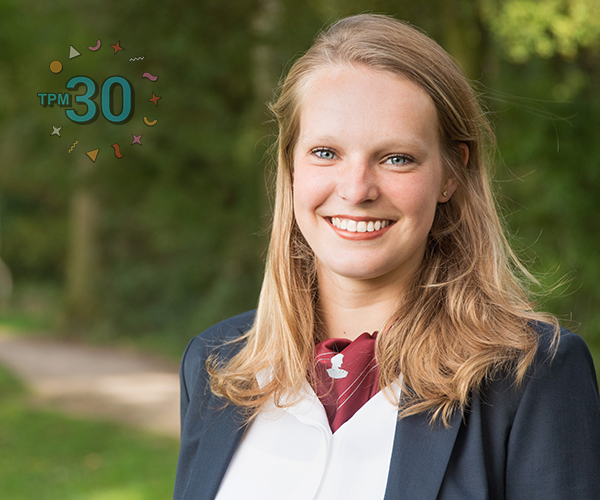TPM Portraits: Parya Lotfi
Parya Lotfi always dreamt of running her own business. Through the Tech-Based Entrepreneurship minor at Technische Bestuurskunde (TB), she was able to realise that dream. Together with four fellow students, she devised and developed a tool for detecting deepfakes in photo and video images. Their company DuckDuckGoose now has major players like the Netherlands Forensic Institute (NFI) and the Dutch House of Representatives as customers. Lotfi hopes to one day use the knowledge she gained at TB in Iran, her country of birth.
In 2017, Parya Lotfi begins her student life studying Computer Science and Engineering at TU Delft. Although she really enjoys programming, she decides to look a door further after the first year. "I found the theory very interesting, but the practical part a little less so. I noticed that I wasn't really a programmer after all. Then I started to reorient myself and ended up at Technische Bestuurskunde."
A course that Lotfi thinks is right up her street. "On the one hand, you have the theoretical side, such as modelling, but there are also practical aspects to it. Such as the fact that you always look how to apply it to a concrete purpose, such as policy-making. After talking to TB student, Pauline, I was completely convinced. She also switched from Computer Science and Engineering and was extremely enthusiastic about TB."
Figuring out what works best
From day one, Lotfi felt completely at home. "Especially because of the subjects I was taught, such as mathematics and problem analysis. In the latter subject, you look at an assignment from different perspectives. Practical challenges usually involve many stakeholders, such as the government, companies, citizens and engineers. What I especially like is that there are often several solutions to a problem. And I get to figure out which solution works best for all parties."
During her studies, Lotfi also works as a student assistant to her Systems Dynamics lecturer, Erik Pruyt. "Among other things, I got to work on a project with the police. Here, we looked at how we could use a model to solve staff shortages. In the end, the police also adopted our model. I thought that was super cool. That as a student I could already mean something for the largest employer in the Netherlands."
Minor in entrepreneurship
In the third year of TB, Lotfi chooses the minor in Tech-Based Entrepreneurship. "As a child, I always wanted my own business. My father, uncle and aunts are also self-employed. What kind of business exactly I didn't know. It could be a café, but also something technical. In the minor, I wanted to further master the intricacies of entrepreneurship. Together with four guys, all of whom I didn't know yet, I formed a project team."
The five-member team was tasked with starting a fictitious company and thereby coming up with a solution to a problem with both a social and technical component. "One of the topics we could choose from was deepfake detection. Deepfake was completely new at the time, but governments and experts were already seeing some dangers. For example, the use of someone's head in a porn film, without the person's participation or consent."
DuckDuckGoose: detecting deepfakes
Drawing on the book Disciplined Entrepreneurship: 24 Steps to a Successful Startup, the team set to work. Lotfi: "One of the lessons from the book was to make a list of 15 sectors for whom the problem is relevant. One was law. In 80 per cent of court cases, photo or video footage is used as evidence. With deepfakes, you can manipulate this image, leading to someone being falsely accused. Law enforcement and judiciary hardly have the means to detect deepfakes."
Contacts in the police force from her days as a student assistant help Lotfi and her team set up a collaborative project. Their venture is named DuckDuckGoose. Lotfi: "The name is a reference to the game with the same name that involves finding the goose among the ducks. This is a metaphor for detecting the deepfake among the real images."
Recognising traces of fakes
Although the assignment does not require it, the team builds a prototype of the deepfake detector. Lotfi: "We found it so much fun and interesting that we started to further develop the detector in our spare time, including using open source material. Eventually, we created a system trained to recognise traces left by a deepfake generator when taking deepfake images."
According to Lotfi the uniqueness of this system is that it can neatly map where those processed traces are located. "This allows the user, such as an expert from the Netherlands Forensic Institute, to see exactly what has been edited on the image. For example, the eyes or the mouth. Detection tools from Microsoft or Intell do not have this explanatory component. These only indicate whether an image is a deepfake or not. While, as a user, you also want to be able to prove what is fake."
Victim of identity fraud
During her minor, Lotfi herself became a victim of identity fraud. "I received a message on LinkedIn from an Italian man that I was offering marketing services on Telegram. He had been approached by someone pretending to be me, but didn't trust it. Then he looked up the real Parya Lotfi - i.e. me. While this was not a deepfake, they could have incorporated my head in, say, a Teams meeting, to make it more credible. That fortunately didn't happen, but it scared me. At the same time, it showed how important deepfake detection is."
Meanwhile, DuckDuckGoose has grown into an actual company with 12 employees. Besides the NFI, the House of Representatives is also among their customers. Lotfi and her co-founders hope to raise external funding in the near future to grow even further. "Besides financial resources, we benefit enormously from our network of mentors, including from YES!Delft. These people have a lot of knowledge and experience in setting up a company and help us take the right steps. Without them, we would probably have stopped a long time ago."
Meaning something to Iran
The freedom of entrepreneurship Lotfi experiences in the Netherlands is in stark contrast to the oppression in her native Iran. "At the age of 12, I fled to the Netherlands. From here, I look with great sadness at the restrictions women in Iran in particular face. Starting a business as a woman there is almost unthinkable. The fact that I do have these opportunities here in the Netherlands motivates me enormously in what I do."
Lotfi hopes to be able to do something for her native country in the future. "Iran is in a poor condition both socially and economically. For example, the way the government acts before, during and after natural disasters could use an improvement, so that an affected area can better recover. Such tasks pre-eminently require a systemic approach involving thorough cooperation. It is my dream to be able to contribute to that one day with my background as a TB student."
TPM Portraits
In the "TPM Portraits" series, we speak to TPM members right across the faculty. In celebration of TPM's 30th anniversary we have had personal conversations with people who are ( or have been) all part of the TPM community in their own way. What have they experienced within the faculty? What is TPM to them today? And how do they see the future? A new portrait appears every two weeks.






